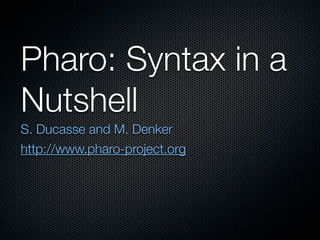
Pharo: Syntax in a Nutshell
- 1. Pharo: Syntax in a Nutshell S. Ducasse and M. Denker http://www.pharo-project.org
- 2. Less is better No constructors No types declaration No interfaces No packages/private/protected No parametrized types No boxing/unboxing And really powerful
- 3. Objects are instances of Classes
- 4. Objects are instances of Classes (10@200)
- 5. Objects are instances of Classes (10@200) class
- 6. Objects are instances of Classes (10@200) class Point
- 7. Classes are objects too
- 8. Classes are objects too Point selectors
- 9. Classes are objects too Point selectors > an IdentitySet(#eightNeighbors #+ #isZero #sortsBefore: #degrees #printOn: #sideOf: #fourNeighbors #hash #roundUpTo: #min: #min:max: #max #adaptToCollection:andSend: #quadrantOf:
- 10. Classes are objects too Point instVarNames
- 11. Classes are objects too Point instVarNames >#('x' 'y')
- 13. Instance variables are protected
- 15. Single Inheritance Object subclass: #Point instanceVariableNames: 'x y' classVariableNames: '' category: 'Graphics-Primitives'
- 16. Complete Syntax on a PostCard exampleWithNumber: x “A method that has unary, binary, and key word messages, declares arguments and temporaries (but not block temporaries), accesses a global variable (but not and instance variable), uses literals (array, character, symbol, string, integer, float), uses the pseudo variable true false, nil, self, and super, and has sequence, assignment, return and cascade. It has both zero argument and one argument blocks.” |y| true & false not & (nil isNil) ifFalse: [self halt]. y := self size + super size. #($a #a ‘a’ 1 1.0) do: [:each | Transcript show: (each class name); show: (each printString); show: ‘ ‘]. ^x<y
- 17. Language Constructs ^ return “ comments # symbol or array ‘ string [ ] block or byte array . separator and not terminator (or namespace access in VW) ; cascade (sending several messages to the same instance) | local or block variable
- 18. Syntax comment: “a comment” character: $c $h $a $r $a $c $t $e $r $s $# $@ string: ‘a nice string’ ‘lulu’ ‘l’’idiot’ symbol: #mac #+ array: #(1 2 3 (1 3) $a 4) byte array: #[1 2 3] integer: 1, 2r101 real: 1.5, 6.03e-34,4, 2.4e7 float: 1/33 boolean: true, false point: 10@120
- 19. 3 kinds of messages 5 factorial Unary messages Transcript cr Binary messages 3 + 4 Keywords messages 3 raisedTo: 10 modulo: 5 Transcript show: 'hello world'
- 20. A typical method in Point Method name Argument Comment <= aPoint ! "Answer whether the receiver is neither ! below nor to the right of aPoint." ! ^ x <= aPoint x and: [y <= aPoint y] Return Binary message Block Instance variable Keyword message (2@3) <= (5@6) true
- 21. Blocks • Anonymous method • Passed as method argument or stored • Functions fct(x)= x*x+3, fct(2). fct :=[:x| x * x + 3]. fct value: 2
- 22. Block usage Integer>>factorial | tmp | tmp := 1. 2 to: self do: [:i| tmp := tmp * i] #(1 2 3) do: [:each | each crLog]
- 23. Statements and cascades Temporary variables Statement | p pen | p := 100@100. pen := Pen new. pen up. pen goto: p; down; goto: p+p Cascade
- 24. Control structures Every control structure is realized by message sends 4 timesRepeat: [Beeper beep] max: aNumber ! ^ self < aNumber ! ! ifTrue: [aNumber] ! ! ifFalse: [self]
